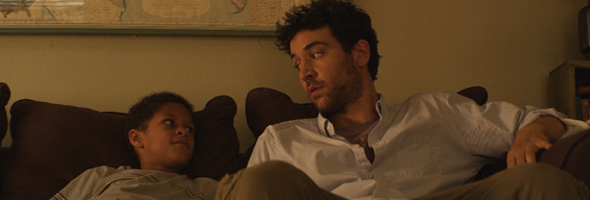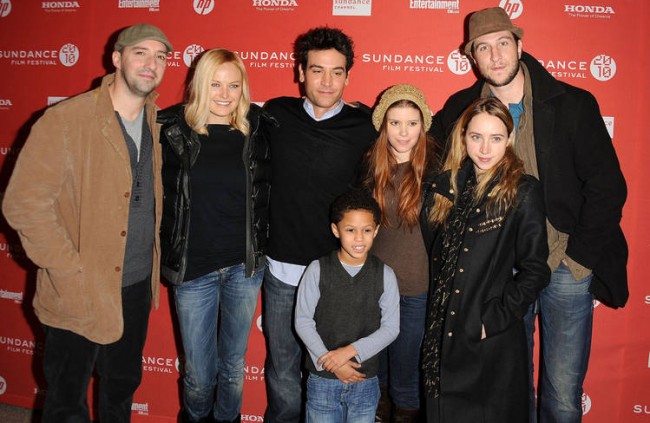
Happythankyoumoreplease is the winsome directorial debut of Josh Radnor, who also wrote and starred in this ensemble comedy that drew resounding praise at 2010’s Sundance Film Festival, taking home an Audience Award. I recently had the chance to see this feature that proudly wears its heart on its sleeve, and instantly took to the film’s warm demeanor, vibrant characters and irresistible soundtrack. (Read my full review here.)
Shortly after Happythankyoumoreplease hit theaters, I had the chance to speak with Radnor, who proved to be as affable and loquacious as the character he plays on How I Met Your Mother. What began as an interview about his filmmaking process soon gave way to an intense conversation, in which we discussed the current trend toward cinematic cynicism and the state of film criticism. With so much to report, I’ve opted to break our interview into two parts.
This week Josh and I discuss how Happythankyoumoreplease developed, and next week we’ll delve deeper as Josh details what drives him and what he makes of our current zeitgeist.
—-
TFS: You have said part of what inspired you to write the screenplay for Happy was the desire to create a new acting opportunity for yourself. Do you recommend this track to aspiring actors?
Josh Radnor: On some level I don’t recommend it; it’s a ridiculous task to take that on!…The thing about acting is you have to get called off the bench to get to do it. With writing no one had to tell me if I could write or not – I could just do that. It’s something I love as much as acting but for totally different reasons, and it’s something I can set the agenda more for.
TFS: As a first time filmmaker, what surprised you most about the filmmaking process?
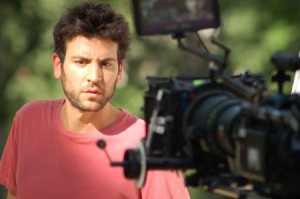
JR: How joyful it was! How much I loved being on set and realizing that this entire community had sprung up around this idea that I had…And this strange feeling of manifesting something – like I dreamed up these characters and then I’m watching the monitor and there they are! They’re actually embodied and we’re creating this strange world. There’s something completely lovely about that to me. And also this army of people rising up to support trying to just capture these honest moments. It’s like this weird thing that the scale of movie making is big, but what you’re trying to catch is the most intimate – at least in this movie – you’re trying to catch really intimate honest moments between people. You know? You’re trying to catch a look in someone’s eye but you have to bring this army and equipment to bear to do it.
TFS: What was it like for you to direct yourself?
JR: I got looser with it as I went, and really started surprising myself more and giving myself more options for the editing room. I found that as I edited I generally was taking my most subtle takes…It was the first experience I had had editing myself. Jack Nicholson has said this thing about watching dailies, “No matter how many awards people give you or how many nice things people say to you, when you watch dailies you release fully that 50% of what you do as an actor is complete shit!” But the pleasurable thing about editing yourself is that you can, ‘Well that was horrible, but no one has to see it. Just me and my editor and we retire it quietly.’… I can’t speak of my own performance – but the cast is so great and really going there. I think it’s everyone’s career’s best work in the movie.
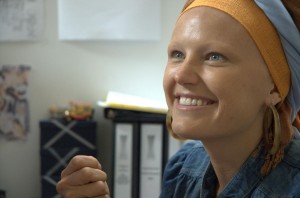 TFS: And Malin Akerman finally gets to take on something other than a thankless girlfriend character.
TFS: And Malin Akerman finally gets to take on something other than a thankless girlfriend character.
JR: Malin’s astonishing in the role [of Annie], and she came after it. She wanted the part and fought for it. She shaved her eyebrows, and she really went there. We worked a lot on it because that character is based…on a really good friend of mine who has Alopecia, so that role was very important to me. I think of Annie as the heart of the movie and I just knew that part needed to be done right. And [Malin] is just a brave and talented and super underrated actress.
TFS: It showcases her really nicely.
JR: Yeah, she’s an incredibly warm and very present person, Malin is. And I think those are qualities that she shares with the character, and that really shone through in her portrayal.
TFS: Can you talk about how Tony Hale (Buster Bluth of Arrested Development) came to play Sam 2?
 JR: Well, I wrote the role and kind of felt he’d be perfect for it. I’d done a bunch of readings out in L.A. and NY and he did a reading for me out in L.A. at my house with Jenna Fischer from The Office was playing Annie – and she was fantastic also – but there was some real magic in watching Tony do the part, he just got it immediately. I had to coax him a bit into the more romantic elements, I think he was a little nervous about that because he’s used to playing these goofballs. And so what I thought was interesting and subversive about having him play this is that he comes onscreen and you’re like, ‘Oh there’s Buster.’ But as you watch the movie you come to realize he’s the most mature, emotionally evolved character in the movie. He knows what he wants and he’s not afraid to go after it. I didn’t know if he’d be able to do it for scheduling reasons, so I ended up auditioning some other actors and saw some really good people, but it’s such a delicate part. It could so easily tip over into Stalker Land. He was able to avoid that through the force of his own ridiculous charm. But a lot of women are a little shocked when they leave the movie and are like, ‘I’m weirdly in love with Tony Hale all of a sudden.’ I think it’s one of those great meetings of actors and parts. I hope people can see it just to use Tony in a bigger way; he’s a real talent that guy.
JR: Well, I wrote the role and kind of felt he’d be perfect for it. I’d done a bunch of readings out in L.A. and NY and he did a reading for me out in L.A. at my house with Jenna Fischer from The Office was playing Annie – and she was fantastic also – but there was some real magic in watching Tony do the part, he just got it immediately. I had to coax him a bit into the more romantic elements, I think he was a little nervous about that because he’s used to playing these goofballs. And so what I thought was interesting and subversive about having him play this is that he comes onscreen and you’re like, ‘Oh there’s Buster.’ But as you watch the movie you come to realize he’s the most mature, emotionally evolved character in the movie. He knows what he wants and he’s not afraid to go after it. I didn’t know if he’d be able to do it for scheduling reasons, so I ended up auditioning some other actors and saw some really good people, but it’s such a delicate part. It could so easily tip over into Stalker Land. He was able to avoid that through the force of his own ridiculous charm. But a lot of women are a little shocked when they leave the movie and are like, ‘I’m weirdly in love with Tony Hale all of a sudden.’ I think it’s one of those great meetings of actors and parts. I hope people can see it just to use Tony in a bigger way; he’s a real talent that guy.
TFS: Happythankyoumoreplease has been described as a love letter to New York, and it features a funny and familiar debate of New York vs. Los Angeles. You’ve lived in both, so how do you think they stack up?
JR: Well I think it’s kind of comical…that it’s an entirely lopsided battle. New Yorkers hate L.A. but people in L.A. have nothing but fond feelings for New York. I live in L.A., but I…went to NYU for grad school and I lived in the city for 6 years or so, and I’m often back. The year I shot the movie I lived in New York for about 6 months so – I have a great fondness for both cities, but I do live in L.A. and I really like L.A. Except for the traffic, it’s a really pleasant place to live. And I totally believe what Charlie says in the movie that LA is just this blank canvas that reflects you back at you – so if you’re happy L.A.’s great, and if you’re not, L.A. sucks. Whereas New York has a much more consistent personality, where you’re in the flow with it and it’s leaving you be or it’s punching you in the face. So I’d say I believe everything pro and con that both characters say about both cities.
TFS: Speaking of New York, you chose a local artist to create the film’s soundtrack. How did Jaymay come into the fold?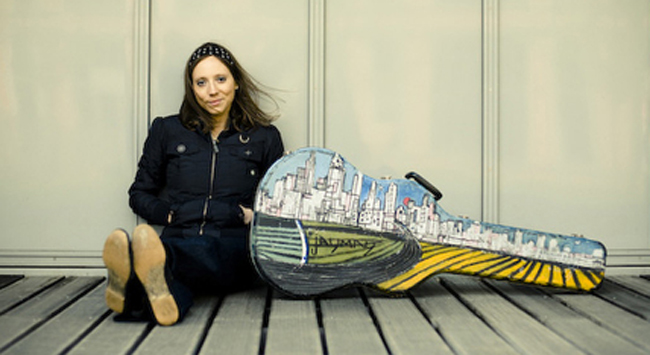
JP: Jesse Hara [the film’s producer] sent me a link to her Myspace page a few years ago and I just immediately was hooked. I played a song of hers called ‘Sea Green, See Blue’ for Carter Bays and Craig Thomas who created How I Met Your Mother, and they both independently said, ‘This should be the last song of season 2.’
When we were conceiving of the sound of the movie, Jesse and I just kept saying, ‘We’ve got to have a Jaymay song in there – maybe two maybe three’ ’cause she writes about New York and relationships and obviously this movie is about New York and relationships, and then she started writing songs during preproduction. I sent her drafts the script so she knew about the project even before it was financed or anything. She had read it and loved it and I talked to her about doing some music for it. But it turned into a much bigger [involvement] once we started making the movie, and especially in the editing room. I just kept finding that her music just worked better than any other music. And she kind of became the troubadour of the movie.
TFS: Is the soundtrack going to be made available?
JR: I don’t know. Everything seems to be kind of backwards now. I think we’ll have to wait and see if a proper soundtrack is going to come out. But all of Jaymay’s music that’s in the movie, I think, is available at i-Tunes. And then there’s other great music in there: there’s a Shout Out Louds song at the start of the movie, which is a great Swedish band. Cloud Cult is one my favorite bands, they’re out of Minnesota. And Blind Pilot, Dr. Dog, I guy I know from LA, Brendan Hines, did that “Miss New York” song which is so great. So there’s a lot of great stuff in there, but it’s mostly Jaymay.
(For a taste of the soundtrack, click here.)
TFS: Happy has a deeply optimistic message, saying “with gratitude the universe is infinitely abundant.” What are you most grateful for concerning your experience making Happythankyoumoreplease?
JR: I noticed when I got to Sundance that the film was really affecting people… it wasn’t like people were saying, “Hey this is a really good movie!” Something else was going on, and I’m still trying to figure out what it is, but it’s also the quality that’s making some people allergic to it somehow. So I don’t know what that fault line is. I always said that the movie was a litmus test for people’s cynicism…I’m not saying it’s a perfect movie or that it’s the final word in sincerity or anything…It’s just been fascinating to get this movie into theaters and talk to people who were intensely affected by it. And that’s something I can’t accept all the credit for, because I had amazing people supporting me. But it’s an amazing feeling to be able to communicate something that is so dear to you and to inspire people – a lot of people told me that they were inspired by the movie and that it made them want to be a little braver in their lives. That’s really interesting to me. That’s more interesting to me than moviemaking. You know what I’m saying? I’m not like a cinema buff, obsessed with angles and shots — I’m more interested in finding something that’s truthful and finding something that’s moving and getting it onscreen, and hopefully juxtaposing those moments into a larger piece that is affecting and is moving. If I’m going to make movies, that’s the kind of movies I want to make. I’m more interested in that emotionally in a grand way than I am in just always making movies. If it happens in plays, I’ll do plays. If it can happen in books, I’ll write books. 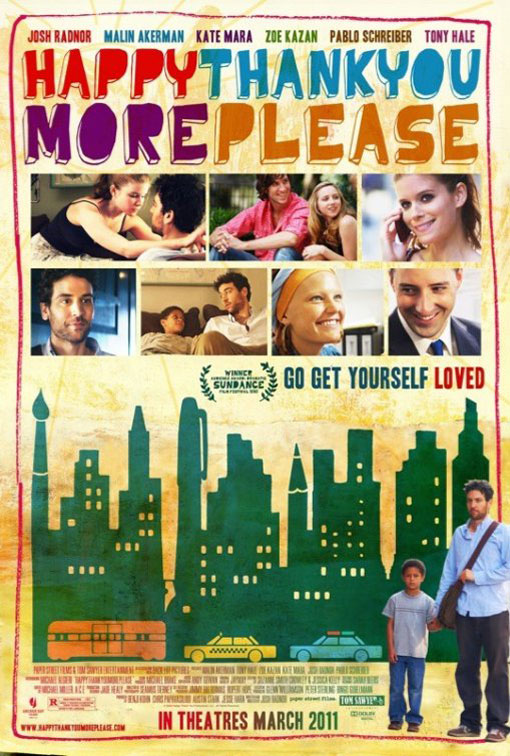
TFS: To that end, do you have another film in the works?
JR: Yeah, I’m doing one this summer. It’s set at a small liberal arts college in Ohio, not unlike the one I went too. It’s kind of my love letter to academia and books and all sorts of dorky stuff.
TFS: Is it a comedy or a drama?
JR: It’s kind of the same thing [as Happy], it’s like a bittersweet conception.
TFS: You have said that your hope for Happythankyoumoreplease is that people would walk out with a “good movie glow.” What’s a movie that gives you that glow?
JR: Well you know I have my kind of all-time favorite movies that all seem to do that… like Tootsie, Broadcast News, I’m weirdly obsessed with Before Sunrise and Before Sunset, Linklater movies, and I recently re-watched Breakast Club on New Year’s day with some friends and was like, “Wow!” It was like I remembered every frame, but it totally holds up… I find [films to be] a great kind of campfire to gather people around and tell a story.
—-
Happythankyoumoreplease is currently in limited release. To see if it’s coming to a theater near you, check here.
For more on Josh and Happythankyoumoreplease, check back next week for part 2 of this interview.

